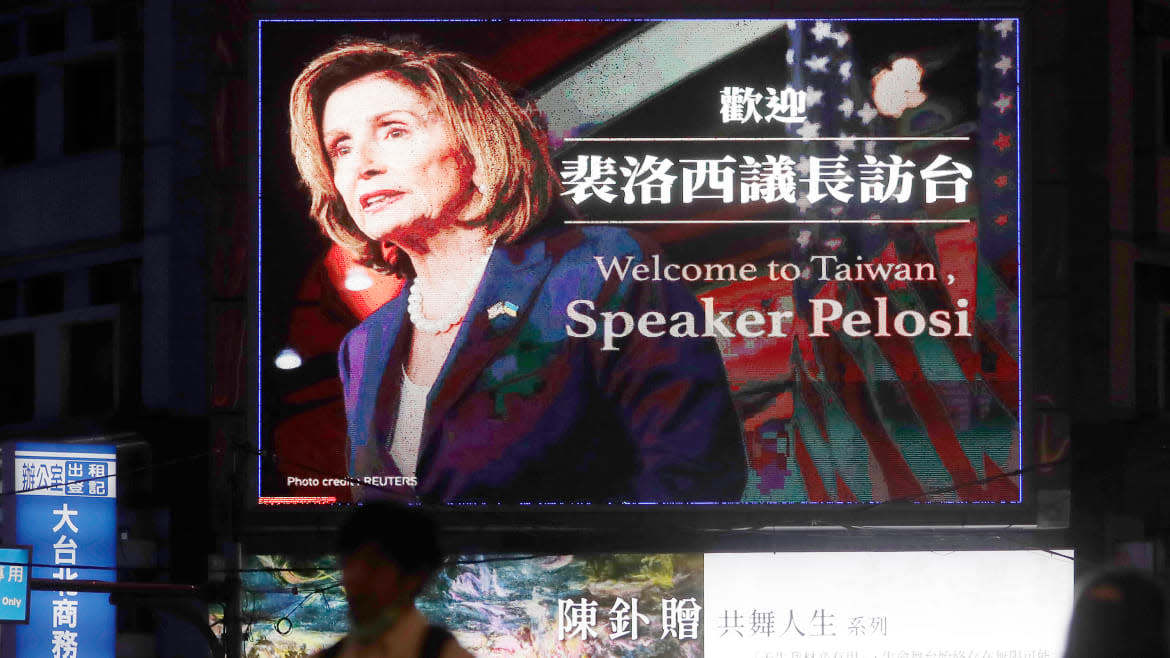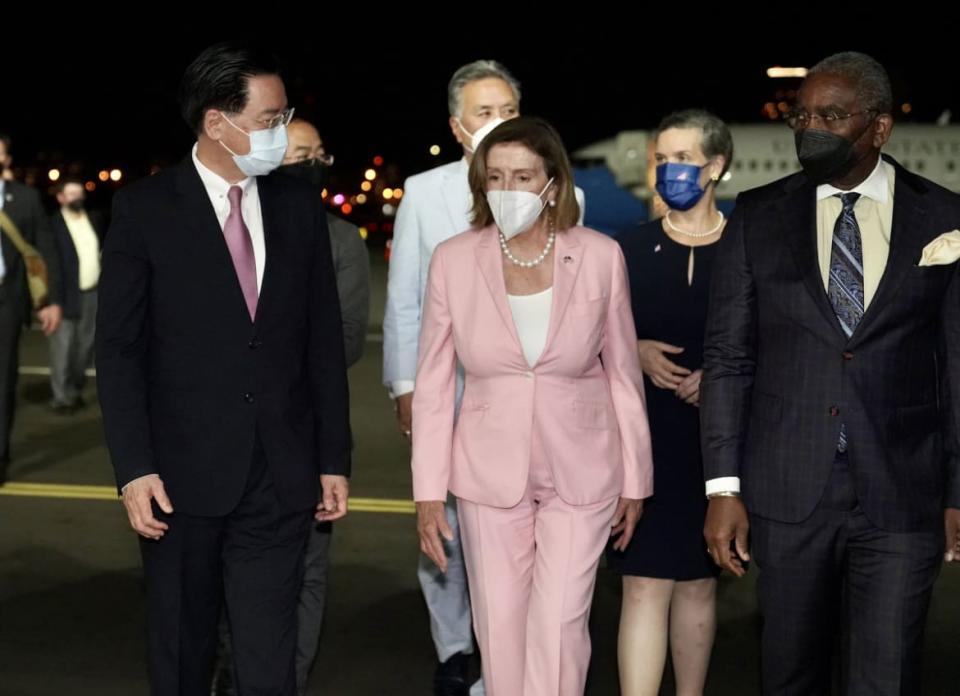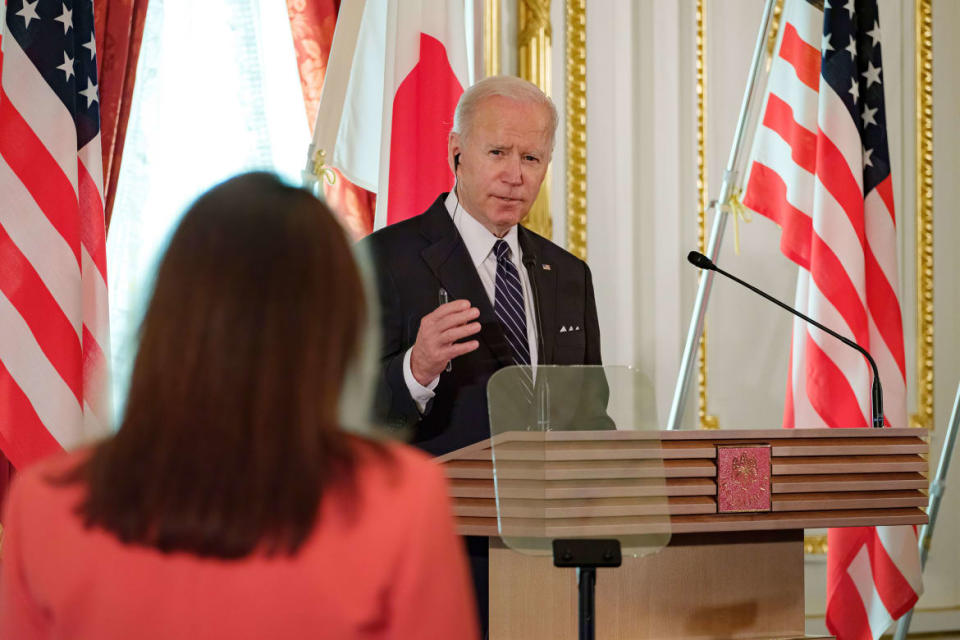Pelosi’s Taiwan Trip Isn’t Helpful to Anyone But China

The primary (and very likely only) beneficiary of House Speaker Nancy Pelosi’s trip to Taiwan is the People’s Republic of China. Virtually none of the goals that the California congresswoman seeks to advance by making the trip—the highest level visit by a U.S. official in a quarter century—will be achieved. Taiwan will not be strengthened. In fact, the trip is already increasing tensions across the straits of Taiwan at a dangerous moment.
Senior Biden administration officials attempted to dissuade Pelosi from making the trip to Taiwan for just this reason.
One senior administration official told me prior to the Speaker’s trip that while they did not anticipate that China would actually invade Taiwan in the next couple of years, they did think that another straits crisis akin to that which took place in 1996 was possible. That could include a Chinese effort to impede naval traffic into and around Taiwan, military shows of force, Chinese air force fly-overs, and other activities—each of which would be accompanied by the danger of unintended escalation, the official said.
Biden Keeps a Promise With His Zawahiri Strike
Further, such a stand-off could also have chilling effects on the global economy, from making markets jittery to the devastating consequences that could result should anything interrupt the vital flows of semiconductors from Taiwan.
To put the risk in perspective, the last major straits crisis, in 1996, brought the US and China to the brink of war. Years after the crisis, former U.S. National Security Advisor Anthony Lake told me that it was as close to a major power conflict as the Clinton administration had encountered during its eight years in office.
With China much stronger and arguably more belligerent today than it was a quarter century ago, the stakes are even higher. It is one of the reasons that the Biden administration has made such a priority of strengthening its Indo-Pacific alliances and, in the wake of Russia’s invasion of Ukraine, has repeatedly sent the message to China that an attack on Taiwan would likely produce a similar response of global support for the island.
The sensitivity of the situation is underscored by the fact that the Biden administration has again this week reaffirmed the “one China” policy that has been a centerpiece of U.S. policy in the region since 1979, assuring the Chinese government that we do not support efforts to further assert Taiwanese independence from Beijing. (Meanwhile the Chinese government, fearing that the U.S. would abandon the policy, have warned such a move would unleash “ferocious storms.”)

US House Speaker Nancy Pelosi being welcomed by Taiwanese Foreign Minister Joseph Wu after landing at Songshan Airport in Taipei, Taiwan on August 2, 2022.
On the eve of Pelosi’s trip, China ratcheted up pressure with new tariffs on Taiwanese goods and more military activity near Taiwanese territory. As she landed, there were reports of a cyber attack targeting the website of the office of the Taiwanese president that many suspected had Chinese origins.
Taking a strong stand against China is nothing new for Pelosi. She has been a China hawk since she entered the Congress. In fact, I remember the first time I met her in her office on Capitol Hill was shortly after the 1989 Tiananmen Square massacre and her message—one she later delivered in China despite howls of protest from the Chinese Communist Party (CCP)—was one of staunch support for Chinese democracy activists.
There is no question that her decision to go is principled, based on three decades of consistent policy. Personally, I hold the Speaker in the highest regard. I believe she is one of the most extraordinary and effective leaders in modern American political history. She is a brilliant woman and make no mistake of it, she is at the peak of her powers, masterfully leading Democrats in the House at a very difficult moment in American history. But in this instance, she has made an ill-considered decision.
While she seeks to show U.S. support for Taiwan, undertaking her trip at this sensitive moment in the U.S.-China relationship has compelled the Biden administration to distance itself from her position. The White House is, obviously, wary of escalation while engaged in leading Western efforts to support Ukraine and dealing with serious economic and political challenges at home.
Further, while Pelosi is not alone among U.S. political leaders from both parties that are sympathetic to the Taiwanese—who have built a flourishing democracy since breaking away from China in 1949—her trip is not likely to change the strategic calculus associated with the Taiwan-China relationship. Even though President Biden earlier this year implied the U.S. would go to war to defend Taiwan, he was later obligated to walk that statement back.
Instead, the administration has reverted to what has been U.S. policy for decades, which is to promise to provide defensive support for Taiwan. That could take the form of arms transfers. It could even involve redeployment of U.S. military and economic pressure on China. In fact, it might well look a lot like what the U.S. is currently doing to support Ukraine.

Joe Biden at a press conference in Japan earlier this year said he'd defend Taiwan if it was attacked.
In the same vein, however, contrary to what many would like to think is shrouded in America’s policy of “strategic ambiguity” regarding how it would respond to a Chinese attack on Taiwan, the reality is the U.S. would be unlikely to go further and engage in a superpower war with China—even over a direct Chinese invasion of Taiwan.
So, although Pelosi is showing support for Taiwan, her trip is shrouded in controversy, her government is repudiating the trip, China is ramping up pressure on Taiwan, and the strategic calculus to defend Taiwan remains unchanged. The trip does not strengthen or positively change the position of the Taiwanese in any way.
On the other hand, Beijing has been given a useful tool to suggest that any rising tensions along the straits are actually being provoked by the U.S. The CCP can argue that the U.S. is actively meddling in regional affairs and use that to justify any military build up, exercises or other activities it may undertake. This further sends the message to Taiwan that China means business when it opposes further steps toward independence.
You’re Going to Miss the Deep State When It’s Gone
In addition, as the columnist Tom Friedman, who also opposes the Pelosi trip, points out in The New York Times: “By visiting, Pelosi will actually give Xi an opportunity to divert attention from his own failures—a whack-a-mole strategy of trying to shut down the spread of COVID-19 by using lockdowns of China’s major cities, a huge real estate bubble that is now deflating and threatening a banking crisis and an immense mountain of government debt resulting from Xi’s unrestrained support for state-owned industries.”
Further, of course, the trip also shows discord atop the U.S. government and muddles the diplomatic efforts of the U.S. government more broadly—with China, with other adversaries, and with our allies.
With some luck, this trip will pass without triggering the worst sort of unintended consequences. But it is very unlikely that it will do any good in the long run, it has for the moment, at least, made a bad situation even more dangerous, and it has strengthened Beijing’s hand. It does not change the long-term strategic calculus. If anything, it makes a risk-fraught situation even riskier.
Pelosi’s impulse to provide support for a democratic friend is worthy. The means she has chosen, however, to demonstrate that support are not only unlikely to advance her goals, they may well undermine them.
Get the Daily Beast's biggest scoops and scandals delivered right to your inbox. Sign up now.
Stay informed and gain unlimited access to the Daily Beast's unmatched reporting. Subscribe now.


